Cetacean training and beach cleanup
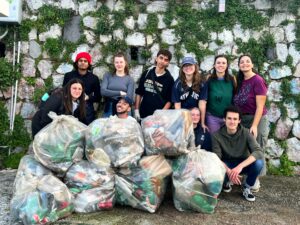
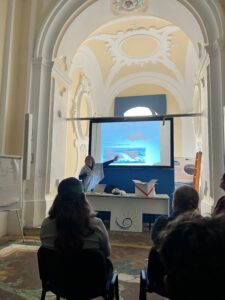
At the beginning of the third week of project M.A.R.E Supporting Team set from the 5th of November to the 1st of December the volunteers took part in training sessions about cetaceans organised by the Marine Protected Area of Punta Campanella, to learn about the importance of monitoring these species and how to act in case of sighting. This activity was intended to increase the young volunteers’ knowledge on marine biodiversity and foster greater ecological understanding. By learning how to recognize and monitor these species and what to do if they see them, the volunteers gained valuable knowledge about how to care for marine life. This training helps them understand the challenges cetaceans face, like pollution and climate change, and how humans can make a difference. It was very important for the volunteers because Cetaceans, like dolphins and whales, are a key part of marine biodiversity, and understanding them helps protect the ocean’s ecosystem. This activity not only teaches the volunteers practical skills but also deepens their respect for the sea and its creatures.
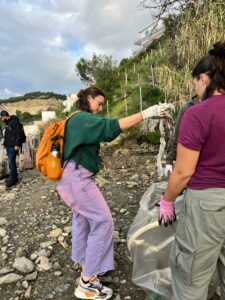 United by their shared commitment to protecting marine species, the volunteers put their knowledge into action with a hands-on activity: an intense beach cleanup at Marina della Lobra, a small fishing village located in the town of Massa Lubrense. The volunteers worked together to remove plastic, bottles, fishing nets, and other waste that could harm animals like fish, turtles, and seagulls. During the beach cleanup, the volunteers found a variety of waste, showing how much litter can accumulate in such a beautiful place. Among the items collected were pizza boxes, plastic bottles, cigarette butts, pieces of polystyrene, small plastic fragments, cans, glass bottles, flip-flops, plastic bags, buoys, boat ropes, sunglasses, and even tubes.This practical activity was not just about collecting litter, it was about understanding the direct connection between pollution and the health of marine life.
United by their shared commitment to protecting marine species, the volunteers put their knowledge into action with a hands-on activity: an intense beach cleanup at Marina della Lobra, a small fishing village located in the town of Massa Lubrense. The volunteers worked together to remove plastic, bottles, fishing nets, and other waste that could harm animals like fish, turtles, and seagulls. During the beach cleanup, the volunteers found a variety of waste, showing how much litter can accumulate in such a beautiful place. Among the items collected were pizza boxes, plastic bottles, cigarette butts, pieces of polystyrene, small plastic fragments, cans, glass bottles, flip-flops, plastic bags, buoys, boat ropes, sunglasses, and even tubes.This practical activity was not just about collecting litter, it was about understanding the direct connection between pollution and the health of marine life.
Supporting the sustainable farming at FAI
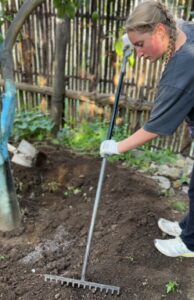
Of course, an important part of the week was the work with FAI, where the volunteers helped prepare the soil for the vegetable garden and fertilized the lemon trees for the upcoming harvest season. By getting their hands dirty, they played a part in supporting sustainable farming practices and ensuring the lemon trees will thrive in the next season. It was a rewarding experience that combined teamwork, learning, and respect for nature. The volunteers one more time connected with the land and contributed to its care.
Marine Conservation Insights: Sea Turtles and Human Impact
Another important activity for the volunteers of the project was attending, on November 21st, a conference on marine conservation biology, at Sant’Anna Institute of Sorrento, made by american students which was divided into two sections.
The first section focused on Sea Turtle Nest Conservation (Project Turtlenest). Project Turtlenest, part of the EU’s LIFE program, focuses on the conservation of sea turtles, particularly loggerhead turtles (Caretta caretta), across the Mediterranean region. This initiative aims to protect and monitor nesting sites, educate communities, and enhance awareness about the critical role sea turtles play in marine ecosystems. Key efforts include assessing nesting habits, safeguarding habitats, and reducing threats from human activities such as pollution, coastal development, and light pollution, which can disorient hatchlings. 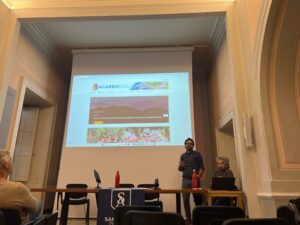
Acarbio staff has been pleased to share our summer experience with the nesting of a turtle and the hatching of hundreds of little Caretta Caretta. Here, the volunteers learned about the efforts to protect sea turtle nests, the challenges these species face, and the importance of preserving their habitats for future generations.
The second section explored “human impacts on the marine environment” and how aware people are of these issues. This session highlighted the effects of pollution, overfishing, and climate change on marine ecosystems and discussed ways to educate and involve communities in reducing these impacts.
The intercultural nights
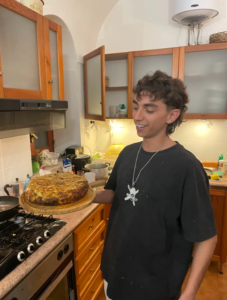
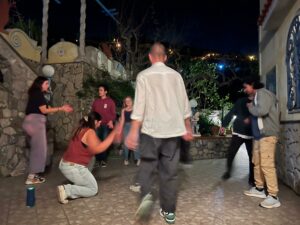
Unmissable during the project were the intercultural nights: in this beautiful experience Alex from Spain showed his culture and habits during the Christmas period, cooking for the rest of the group his typical dishes and listening to his favourite catalan music. Followed by the “balkan night”, a mix of Greek and Bulgarian recipes made the the volunteers feel like in two different countries, thanks to Kelly from Greece and Georgi from Bulgaria the team had the opportunity to travel through food and typical dances. Intercultural nights are a key part of any international volunteering experience. They go beyond just sharing food and traditions; they build connections. Through dishes, music, and dances, volunteers bring their cultures to life, creating a space where diversity is celebrated.
Credits: Aqib, Aurore, Alex, Albertina, Anaïs, Georgi, Emma, Kelly, Quentin, Mehdi and Rita
